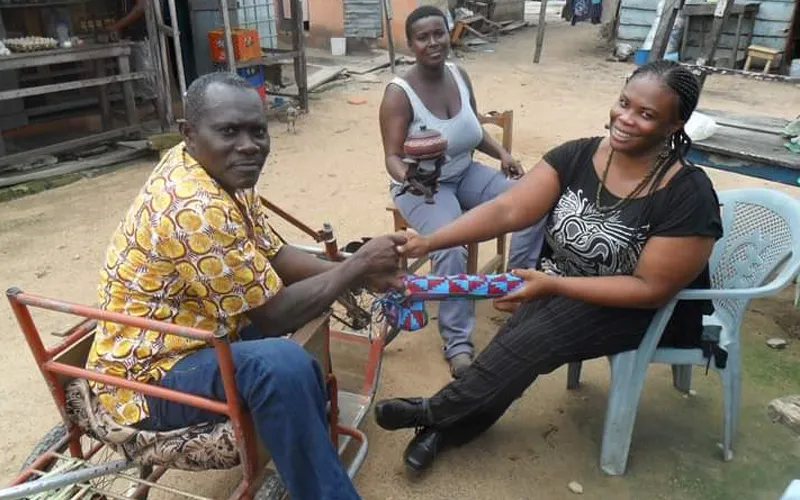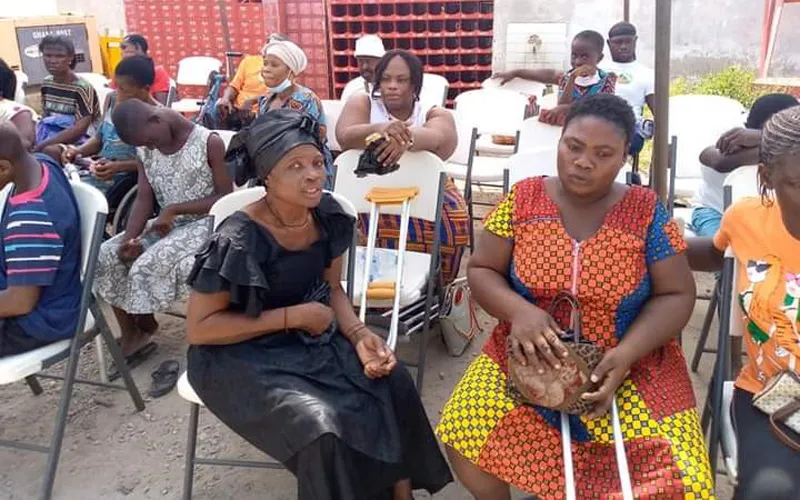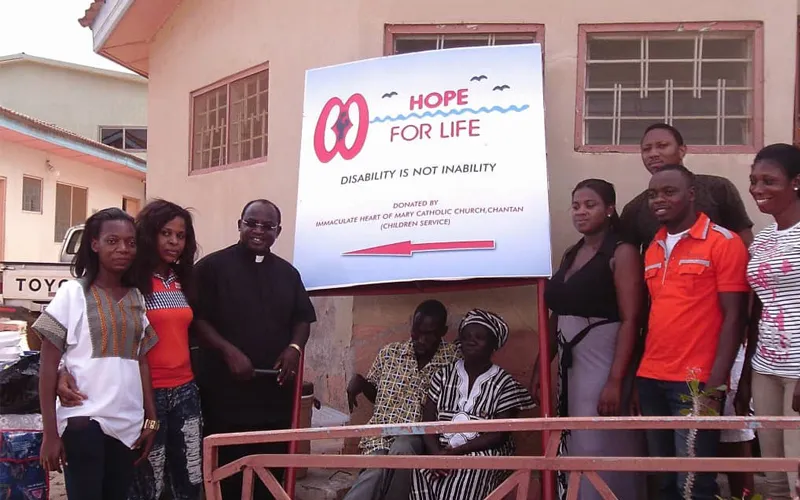“We have interns and they are sent to the communities to do advocacy campaigns about the physically challenged and how disability is not an inability, they encourage parents who have physically challenged children to register with the organization,” he says.
People with disabilities are admitted at the home that also has doctors and lawyers as members to provide expert services.
At Bethany House, administrative work as well as skills training takes place. Additionally, a bakery is managed at this facility to provide a source of income to the organization. Fr. Ennin tells ACI Africa that the bakery has employed some of the people living with disabilities.

A social worker has also been employed at Bethany House to offer pastoral care to the people living with disabilities who come to the house with various concerns.
(Story continues below)
“Besides the people coming to the house, the social worker also visits the people,” the Priest says, and adds, “Sometimes, it is the families that need counselling. The social workers visit them to listen and help them overcome the challenges of taking care of the physically challenged. The families need accompaniment so that they will be able to understand the situation of the people living with disabilities.”
The project empowers its clients depending on each person’s needs, Fr. Ennin says, adding that there are those who learn soap making, beadwork, shoe making, (and) tilapia farming to equip them with financial independence.
Others needing medical attention are sponsored through medical procedures while those in need of education are taken back to school. Others are provided with wheelchairs and crutches to help with their mobility.
The members of SMA involved in this initiative have partnered with the Sisters of Mary Mother of the Church (SMMC) to manage the activities of the project.
“SMMC sisters were founded by an SMA Priest and they share part of our charism. They also have social workers, caterers, nurses and people who have been trained to work with those with disabilities. We need this expertise,” Fr. Ennin says of the partnership that was launched May 2.
Regarding the funding of the organization, the Catholic Priest says, “This is always an issue but God has been good. We get funds from different donors and people of goodwill.”
“The champion funding is the disability fund that we receive from the district level of the government. It isn’t a lot but it is something,” he says, and adds, “It was extremely tough for us during COVID-19 lockdown but people of goodwill came through for us.”
The organization, Fr. Ennin says, faces the tough challenge of getting a reliable source of funding.
In his message to families raising children living with disability, the Catholic Priest says, “Every life is a gift from God and every gift from God is a blessing. I encourage parents, brothers and sisters who are living with people who have various kinds of disabilities to know that there are a lot of gifts and talents in that person and they should help, encourage and empower the person to become who God wants them to be.”
The families, Fr. Ennin says, should not see disability as begging as “God’s gifts are abundant to the physically challenged people.”
“Open your minds and hearts to help these people fulfil and actualize their potential,” he says.
Fanny Amartey who has served as the Administrator of Hope for Life for seven years expresses her gratitude for being brought up in a family where her parents were enlightened about disability, giving her the best opportunities to study.
“I have been a member of the organization for over 15years. I use crutches and a caliper on the right leg,” Ms. Fanny told ACI Africa in an interview last week.
The Hope for Life Administrator said that all her life, before joining the organization, she was never able to interact with persons with disabilities.
“I was more antisocial and never mingled with them. I had interacted more with able-bodied people. I was brought up in the middle class and I hardly saw people with disabilities. I used to be very shy,” she told ACI Africa.
“I went to a normal school and made friends with able-bodied people and went to places where you do not get to meet people with disability,” Ms. Fanny said, and added, “I saw myself as the only person with disability in the world.”
She said that joining the group made her confident and vocal, adding, “I realized that when you have a disability, most of the time you’re looked down upon and it's survival for the fittest. You have to shove away the stigma otherwise you can never make it.”
Ms. Fanny said that children who have suffered from polio go through a lot of pain, which gets worse as one grows older.

“We have post-polio and this gets serious as you grow older. It comes with pain. And getting up to go to work is a problem but when you have a skill, you can rely on that,” she said, and added, “Hope for Life has made me realize this.”
At Hope for Life, there are children aged between 0 and 18 years as well as a parents’ support group for families raising children living with disabilities.
Highlighting the support given to the parents raising children with disabilities, Ms. Fanny said, “We take them through a vocation and give them a start-up which can also help them stay with their kids and work at the same time. We try to liaise with banks to give loans or grants to help with the start-ups.”
As for the children, especially those with cerebral palsy and autism, Hope for Life has a program that facilitates their therapy.
One of the challenges that the organization has observed in Ghana is the rise in the number of single mothers who are living with disability.
Ms. Fanny said that for their disability, most young women think that they are vulnerable and therefore “end up making the wrong choices.” It is one of the misconstructions that the organization is trying to demystify in the support group meetings.
“I have realized that most of our female members happen to be single mothers and I find that to be a very big problem. I realize that most women with disability think they are vulnerable and they end up making wrong choices,” the official of Hope for Life told ACI Africa, adding, “We address this in our meetings by inviting facilitators to talk about it.”












